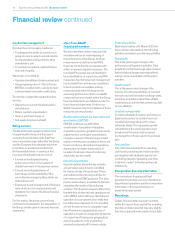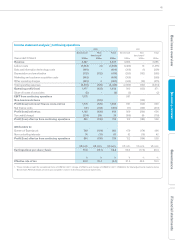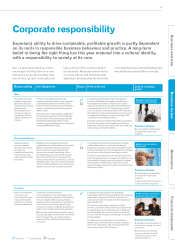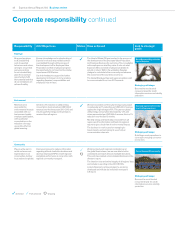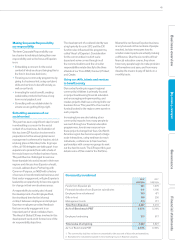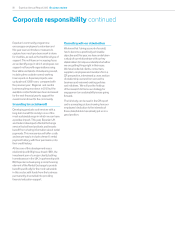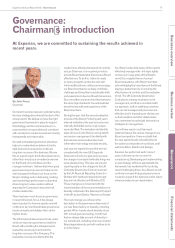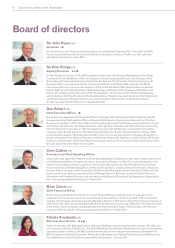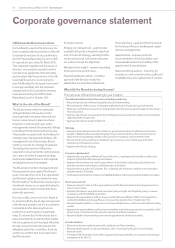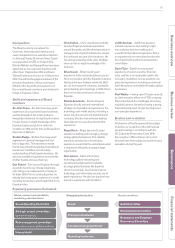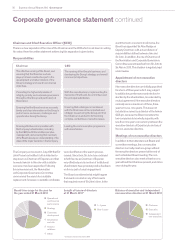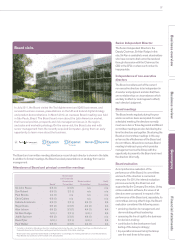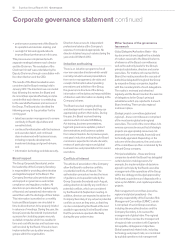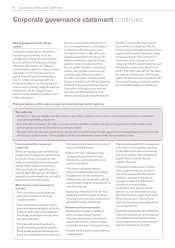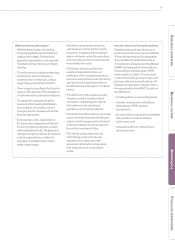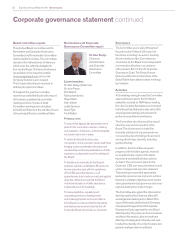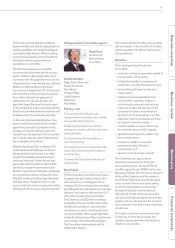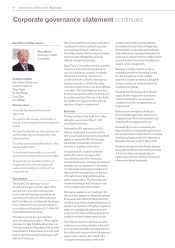Experian 2012 Annual Report Download - page 56
Download and view the complete annual report
Please find page 56 of the 2012 Experian annual report below. You can navigate through the pages in the report by either clicking on the pages listed below, or by using the keyword search tool below to find specific information within the annual report.
54 Experian Annual Report 2012 Governance
UK Corporate Governance Code
It is the Board’s view that the Company has
been compliant with the provisions of the UK
Corporate Governance Code, published by
the UK Financial Reporting Council in 2010,
throughout the year ended 31 March 2012.
This statement, together with the report on
directors’ remuneration, explains how the
Company has applied the main principles
and complied with the provisions of the UK
Corporate Governance Code during the
year. Additionally, the Company has chosen
to comply voluntarily with the proposed
changes to the UK Corporate Governance
Code announced by the UK Financial
Reporting Council in October 2011.
What is the role of the Board?
The Board is responsible for setting the
strategic direction of Experian and for
ensuring that the necessary financial and
human resources are in place to achieve
the goals. In January each year, senior
management presents the proposed strategy
to the Board for the following financial year.
This provides an opportunity for the Board to
critically review the proposed strategy with
management and, at the January Board
meeting, consider the strategy for approval.
The budget discussions in March are
essential for ensuring that the right resources
are in place to deliver the agreed strategy,
and include detailed focus on both regional
and global business line budgets.
The Board also monitors management and
financial performance against the Group’s
goals. To enable them to do this, operational
and financial updates are provided at every
Board meeting. The Board also receives post-
investment reviews on an agreed timeline for
any acquisitions and/or investments it has
previously approved.
It is not possible, or correct, for the Board to
be involved with the day-to-day management
of the Group’s activities, but it is accountable
to shareholders for delivering financial
performance and long-term shareholder
value. To achieve this, the Board has put in
place a framework of controls which enable
risk to be appraised and managed effectively
through clear and robust procedures and
delegated authorities. In addition, there are
certain key activities that it has reserved to
itself for decision.
Examples include:
Strategy and management – approval and
oversight of Experian’s long-term objectives
and commercial strategy, ensuring that the
necessary financial and human resources
are in place to meet the objectives.
Management oversight – review of operating,
financial and risk performance.
Regulatory/statutory activity – including
approval of the Group’s results, key
stakeholder documents and dividends.
Finance/treasury – approval of the framework
for the Group’s finance, banking and capital
structure arrangements.
Appointments – approval, upon the
recommendation of the Nomination and
Corporate Governance Committee, of the
appointment of new directors.
Approval of Group policies – including, for
example, an anti-corruption policy, a gifts and
hospitality policy and a global code of conduct.
What did the Board do during the year?
The main areas of Board focus during the year included:
Corporate governance statement
Operational and financial performance, including monitoring
• Received operational and financial updates at each Board meeting.
• Received details of the exercise of delegated authorities by the Group’s principal subsidiaries.
• Reviewed monthly finance reports, including details of performance against budget and the Group’s
financial position.
• Approved the Group’s annual report, full and half-year financial results and made recommendations
regarding dividend payments.
• Approved the Group’s budget for 2012/13.
Strategy
• Received presentations from leaders of the four global business lines: Credit Services, Decision
Analytics, Marketing Services and Interactive. These included details on financial performance,
alignment to Group strategy, market outlook, product innovations and investment needs.
• Received further presentations on initiatives to grow revenue, current challenges and further
development of Experian’s culture.
• Approved the Group’s strategy.
Corporate development
• Approved the acquisition of Medical Present Value, Inc., a leading provider of data, analytics and
software in the US healthcare payments market.
• Approved the formation of a credit bureau with six of Australia’s leading financial institutions to
provide consumer and business credit information in Australia.
• Approved the acquisition of Computec S.A., a leading Latin American credit services information
provider based in Colombia.
• Conducted post-investment reviews on UnitedMail Solutions in Germany and A-Care Systems in Japan.
Governance and risk
• Reviewed reports on risk and the appropriateness of the financial statements being prepared on a
going concern basis.
• Approved the Group’s new global anti-corruption policy and gifts and hospitality policy, to ensure
compliance with the UK Bribery Act 2010.
• Approved the appointments of Brian Cassin as Chief Financial Officer (‘CFO’) from 30 April 2012,
and Deirdre Mahlan and George Rose as non-executive directors from 1 September 2012.
• Received regular updates on corporate social responsibility issues, and the annual health and safety
update.
• Approved recommendations on Board and committee evaluation processes, the composition of the
Board, levels of induction and the annual re-election of all Board members.
• Received details of share dealings and external appointments of Board members.
Investor relations
• Received an investor relations and media update at each Board meeting.
• Reviewed draft analysts’ results presentations, when reviewing the Group’s full and half-year
financial results.
• Through the Remuneration Committee, engaged with top shareholders on proposed remuneration
arrangements for 2011/12.


